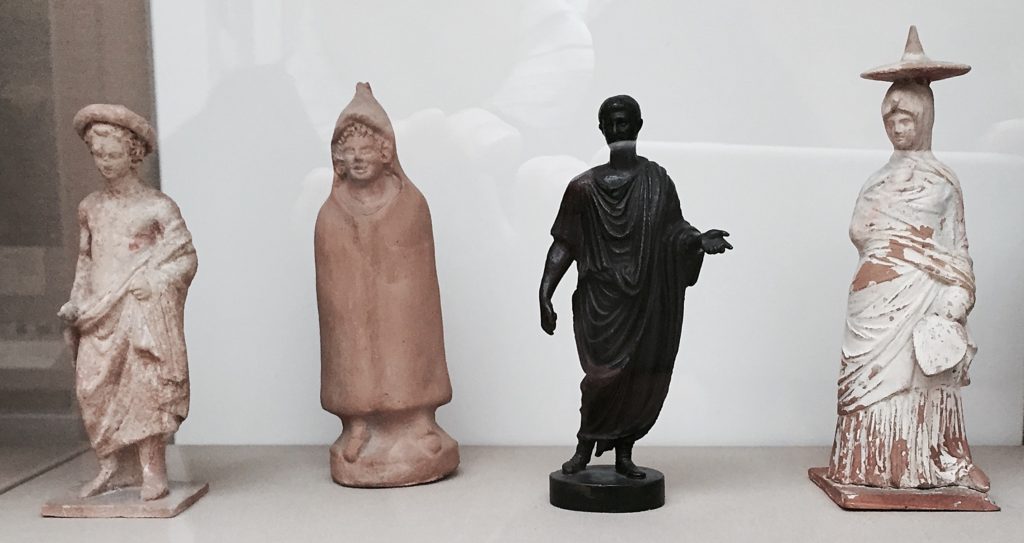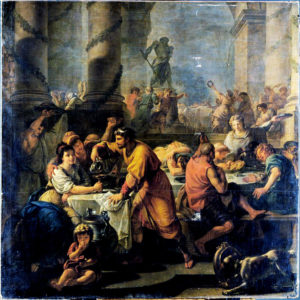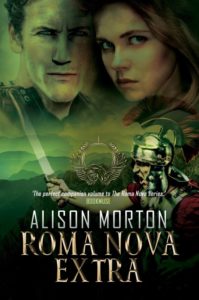Saturnalia was THE most important Roman festival. Heavy on feasting, fun and gifts, it was originally celebrated in Ancient Rome for only a day around 17 December, but it was so popular it expanded into a week or even longer, despite Augustus’ efforts to reduce it to three days, and Caligula’s, to five.
Like today’s Christmas, this holy day (feriae publicae) had a serious origin: for the Romans it was to honour the god of sowing, Saturn. And if nothing else, Romans were a superstitious lot; like many ancient cultures, religious ceremonies and observances held an important place in their lives.
But also like modern Christmas, it was a festival day (dies festus). After sacrifice at the temple, there was a public banquet, which Livy says was introduced in 217 BC. Afterwards, according to the poet Macrobius, the celebrants shouted ‘Io, Saturnalia‘ at a riotous feast in the temple.
Modern mid-winter habits echo Roman ones – increased, often extravagant shopping, conspicuous and over-indulgent eating and drinking, visiting friends, receiving visits from not-particular-friends who are only after a drink, and exchanging gifts, particularly of wax candles (cerei), and earthenware figurines (sigillaria).
Everybody dressed in bright clothes, masters served meals to their slaves who were permitted the unaccustomed freedoms of leisure and gambling. A member of the familia (household) was appointed Saturnalicius princeps, roughly equivalent to the Lord of Misrule. Of course, it often got completely out of hand…
The poet Catullus describes Saturnalia as ‘the best of days’ while Seneca complains that the ‘whole mob has let itself go in pleasures’. Pliny the Younger writes that he retired to his room while the rest of the household celebrated. Sound familiar?
Macrobius described a banquet of pagan literary celebrities in Rome which classicists date to between 383 and 430 AD. So Saturnalia was alive and well under Christian emperors, but no longer as an official religious holiday.
But alongside ran the Dies Natalis Solis Invicti (the birthday of the ‘unconquerable sun’), a festival celebrating the renewal of light and the coming of the new year and which took place on 25 December. By the middle of the fourth century AD, the dominant Christian religion had integrated the Dies Natalis into their celebration of Christmas.
Ever since the end of the Roman Empire, but especially when Roman texts were rediscovered and all things Roman became fashionable again from the Renaissance onwards, people have speculated about what Saturnalia really looked like.
Just how wild was it? This painting by Callet is one of the less explicit images, but while the party-goers are having a good time, it seems more in line with what it could have been like than the bacchanalian depictions by some painters then and film-makers now.
Or were the paintings and stories just a reflection of the artists’ vivid imaginations of the in their own time?
Io Saturnalia!
You can read the short story ‘Saturnalia Surprise‘ about how the Mitelae were surprised one year in ROMA NOVA EXTRA.
—————-
Buy the book from Amazon Kobo Apple B&N Nook Paperback
—————
Updated 2022: Alison Morton is the author of Roma Nova thrillers – INCEPTIO, CARINA (novella), PERFIDITAS, SUCCESSIO, AURELIA, NEXUS (novella), INSURRECTIO and RETALIO, and ROMA NOVA EXTRA, a collection of short stories. Audiobooks are available for four of the series. Double Identity, a contemporary conspiracy, starts a new series of thrillers. JULIA PRIMA, a new Roma Nova story set in the late 4th century, is now out.
Download ‘Welcome to Alison Morton’s Thriller Worlds’, a FREE eBook, as a thank you gift when you sign up to Alison’s monthly email update. You’ll also be among the first to know about news and book progress before everybody else, and take part in giveaways.


















[…] Io Saturnalia! Here’s a fun and well-informed post on the Roman holiday of Saturnalia, celebrated about now each year and often depicted as an orgiastic free for all. Alison Morton notes the distinct parallels to modern Christmas and how this holiday and its companion holiday dedicated to the ‘unconquerable sun’ called dies natalis (day of birth) contributed to the Christian holiday. A fun read from Alison Morton who writes an excellent alternative history series in which Rome lives on in refreshingly creative and unexpected ways. Click here for Alison Morton’s website “Saturnalia: serious Roman festival or free for a… […]
Loved this lesson in how to celebrate. Although, I’m with Pliny the Younger – well, I was on Thanksgiving. Happy festivities, Alison.
Tibi maximas gratias Roland!
Hoffwn ddiolch i chi yn gynnes -Nadolig Llawen, Alison